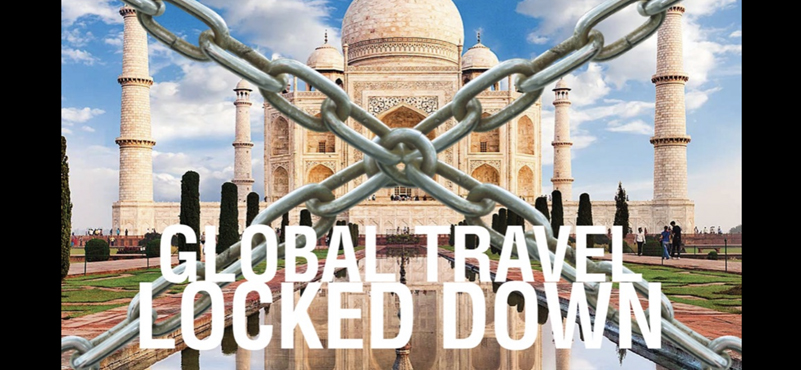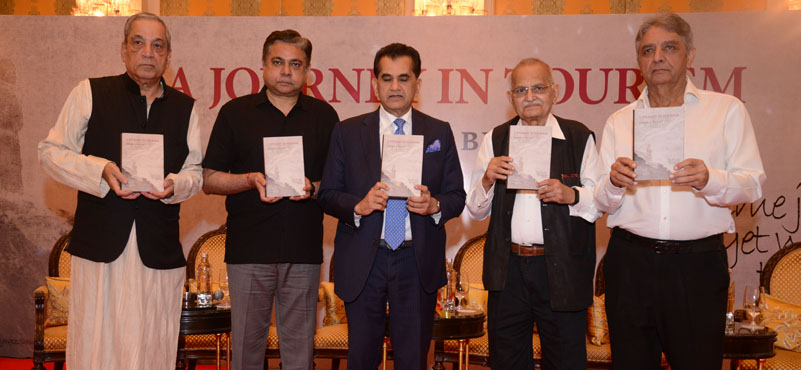WITH the arterial nodes of the country in a state of total lockdown, the travel and tourism sector is not only being mauled in the short term, but will also experience the ripple effects of the Covid-19 pandemic much after the present panic subsides. That’s seriously bad news for a nation struggling to get its travel and tourism act together. It is also an alarming signal to the government to consider a bailout package especially for these most afflicted sectors.
The lockdown will not only spook the financial health of airlines, hotels, restaurants and malls, seriously affect the earning of people employed in the sector, but also leave its burn marks on downstream industries, from OTT platforms to car rentals and banquet halls, from multiple categories of vendors to providers of outsourced services, to local artisans and performers who depend entirely on the tourism economy. The State Bank of India, in fact, has identified transport, tourism and hotels as being the foremost recipients of what it calls the “inoperability shock”.
The more unsettling bit about the lockdown is that we don’t know how long the pandemic will continue its reign of terror. It was The New York Times that first highlighted the grim reality of the pandemic showing no major signs of abating, at least in the western world, for the next 18 months. Bill Gates, who should know his facts better than most, because of his deep commitment to the global search for newer vaccines, has ruled out any satisfactory vaccine being developed before 18 months.
In times like these, it is important to remember that every country has felt stressed beyond its resources. Our capacity to either test a significant percentage of the total population, or treat people who come down with Covid-19 are being increased with best available speed, and the government and private sector has responded to the challenge realistically, without waiting for our resource-constrained healthcare system to be challenged further.
We must resign ourselves therefore to the travel and tourism sector not only being buffeted by the immediate tidal wave of cancellations, but also by a long-term depression because people may not be inclined to travel or spend on “avoidable luxuries” such as going on holidays or eating out even as the Covid-19 scare subsides and the world reverts to business as usual. And for the first time, we have a situation where our travel and tourism sector cannot hope to offset the loss of international revenues from domestic sources. We expect the mood to remain sombre for the long haul – it is possibly early yet to start calculating our losses.
THE NUMBERS OFFER LITTLE HOPE
Global aviation consultancy CAPA estimates that the terminally ill Air India will suffer an additional loss of Rs 3,700 crore in the first quarter of this calendar year; its privately operated counterparts will accumulate a loss of Rs 4,200 crore. Will the aviation sector be able to suffer the losses, or are we likely to see at least one more privately owned carrier going off the skies?
In a detailed study titled ‘Covid-19 and Its Impact on the Indian Hotel Industry’, Hotelivate has estimated that the organised sector may lose $1.3 billion to $1.55 billion in the calendar year 2020. Sharing the “best case scenario”, which assumes that Covid-19’s impact will be as devastating as it is today for the next two to three months, Hotelivate estimates that its “weighted impact” is likely to erode the blended nationwide occupancy by about 18-20 per cent, even as the blended nationwide average daily rate (ADR) may see a drop of 12-14 per cent this year.
During other emergencies, the hotel industry generally balances any decline in room revenues by aggressively pushing the MICE business, in-house restaurants, weddings and outdoor catering gigs, but with the blanket bans in place, these options are not available to the industry. Non-room revenues are most likely to be on a free fall. Taking into account these factors, Hotelivate has pegged the loss of overall revenue for the 140,000 branded / organized hotel rooms across the country at “anywhere” between $1.3 billion and $1.55 billion, which translates into a 27-32% erosion compared with last year’s figures.
These 140,000 rooms represent only about 5 per cent of the lodging sector in India (95 per cent of the supply comes from B&Bs, guest houses, unbranded and unorganised establishments), so Hotelivate estimates an additional revenue loss of anywhere between $4.2 billion and $4.7 billion across the alternative accommodation industry. And these figures assume a return to normality within the next 90 days.
Add to this the losses being incurred by airlines and airports, tour operators, wedding and conference planners, restaurants and retail sector, vendors and suppliers, banquet halls and car rental companies, and you are staring at a far bigger hole in the economy. And international rating agencies are taking a dimmer view of India, which has been trying hard to stave off the controversies over its all-time low GDP growth figures. Standard & Poor’s Global Ratings have already knocked down the country’s GDP growth rate for FY2020 to 5.2 per cent. These would also get reviewed, it is reasonable to presume. Not just for India but also globally.
HUMAN COST OF THE LOCKDOWN
The human cost especially will be painfully too high to handle. In a letter to the Prime Minister, Nakul Anand, Chairman, Federation of Associations of Indian Tourism and Hospitality (FAITH), and 14 of his industry colleagues, underscored the poignancy and urgency of the situation when they said: “Indian tourism industry is looking at pan-India bankruptcies, closure of businesses and mass unemployment. It is believed that around 70 per cent of a total estimated workforce of 5.5 crore (direct and indirect) could get unemployed (around 3.8 crore). These job losses and layoffs have already begun throughout the country, warns FAITH.
FAITH reports that the tourism and hospitality sectors generate business worth “$28 billion+ in forex and upwards of Rs 2 lakh crore in domestic tourism activity”, which will be “at economic risk through the year”. Thus, states FAITH, “in excess of Rs 5 lakh crore of direct tourism business and almost double that of total economic activity are at risk.”
The National Restaurant Association of India (NRAI) estimates that 10-15 lakh jobs will be lost because of restaurants shutting down unprofitable operations to recoup the losses it has suffered since the first week of February. According to the NRAI’s Food Services Report 2019, the organised segment of the sector directly employs 7.3 million and has a combined turnover of more than Rs 4 lakh crore.
“We operate with a very high proportion of fixed operating expenses, which makes our business high-risk even in instances of moderate revenue fluctuations,” said NRAI President Anurag Katriar. “We are now staring at zero revenue in the immediate term and a drop of at least 50 per cent for months thereafter. We are therefore seeking the support of everyone in the ecosystem to mitigate these fixed operating costs so that our losses are contained to manageable levels.”
The government is presently considering a bailout package for the economy as a whole. Mall operators and landlords, too, would have to think long-term and be generous. As consumers and supporters of these sectors, we, too, will have to pitch in to help the travel and tourism sector recover from the shock after the worst is over. Travel and Tourism, given its huge employment potential, definitely deserve a special consideration.
AN EIGHT-POINT BAILOUT PACKAGE
The Economic Task Force constituted under Finance Minister Nirmala Sitharaman will have to take immediate action to bail out this important segment of the economy, which also contributes significantly to GST and VAT revenues. Some of these measures have been addressed by the FM earlier this afternoon. These are some of the most important first steps in the way forward:
* Free up working capital. The central and state governments must act in tandem and defer all statutory dues – GST, advance tax, PF, ESIC, customs and excise duties, and VAT – for a year. A GST holiday must be announced for FY2020-21.
* Accept the restaurant sector’s long-pending demand for the restoration of the Input Tax Credit (ITC) on expenses such as rent on property and hiring of services. The sector has been arguing for quite some time that this is discriminatory and, according to the NRAI, also raises fixed expenses by 18 per cent.
* Automatically renew liquor licences. The payment of the required fee must be deferred by 12 months. Such measures would free up money for restaurant owners to pay wages and salaries and clear the dues of marginal suppliers.
* Introduce ‘unemployment pay cover’ for hotel and restaurant employees, especially for those covered under ESIC. A corpus can be created for this purpose from the money earned out of the recent steep hike in the central excise duty on petrol and diesel.
* Defer all payments for utilities, such as electricity, water and gas. No bills must be raised for March 2020 as a gesture of hope in these volatile times. A holiday from the payment of EMIs and insurance premiums must also be announced. The number of months can be settled upon in consultation with the representatives of the sector.
* Allow a 12-month moratorium on the payment of EMIs and an immediate suspension of interest charged on term loans or working capital for three months. This relief must be offered by both banks and non-banking finance companies (NBFCs). Once the crisis blows over, working capital limits for the travel and tourism sectors must be doubled on a no-interest, no-collateral basis.
* Fast-track the settlement of insurance claims and defer any increase in premium amounts. Times such as these will lead to a ballooning of insurance claims, especially the ones that arise out of the cover that businesses take from insurance companies to safeguard themselves against unforeseen circumstances. The Ministry of Finance must ensure that these claims are honoured and settled fast by both public and private sector insurance companies.
* Defer TCS proposed in the Finance Bill 2020. The provision for a tax collected at source on travel proposed in the Finance Bill 2020, and up for implementation on April 1, 2020, must be deferred till the next financial year. The tax, the industry fears, will displace business from India to overseas.
If the central and state governments cooperate to implement this relief package without losing precious time, mall owners and high-street landlords must also pitch in by declaring March and April as no-rent months and not charge for utilities for another month or two.
When it is time to start again, we can then reach out to Indian citizens and suggest to them to show that they care by visiting at least five destinations within India before taking their first overseas holiday and by eating out or eating in at least once a week to help restaurants get back on their feet. The Prime Minister has drafted each one of us in our nationwide war against Covid-19. In the same way, each one of us as citizens, can contribute in our own little ways to make a real difference to the lives of all those men and women who work long hours just to feed us well and make us happy.
– By Sourish Bhattacharyya




































